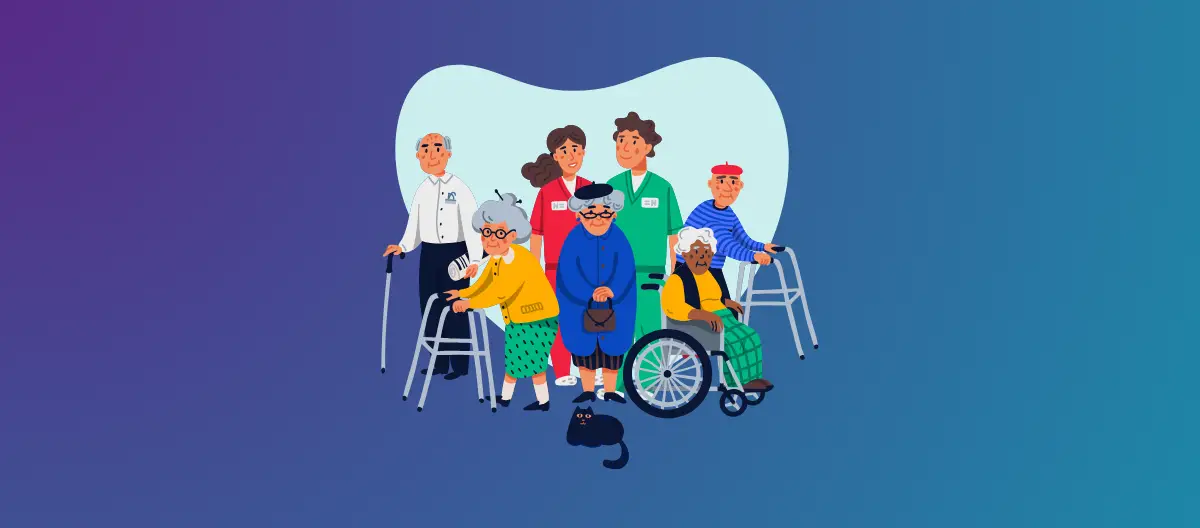If your organisation provides end of life care services, you probably know all about supporting your clients and their families. But it’s also important to consider your care team.
Providing care and comfort at the end of life can be a challenging job – not only physically, but also emotionally. Your care colleagues may need extra support while providing end of life care, and after the service user has died.
In this article, we’ll talk about what end of life care services are, some of the challenges of palliative care and end of life care, and how you can support your care team.

Table of Contents
What are end of life care services?
End of life care is the support offered to people who are near the end of their life. It may include personal care, emotional support, medical care, and support with administration such as wills.
It’s not intended to cure the service user’s illness. Instead, it focuses on making sure that they are as comfortable as possible, both physically and mentally. Some people might receive end of life care in a care home, their own home, hospital, or hospice.
End of life care services should also support the client’s family and others close to them.
What are palliative care services?
Palliative and end of life care services are different, although some people may use the terms interchangeably.
Palliative care is provided to someone who has a life-limiting illness or condition. Receiving palliative care doesn’t mean that the client will die soon – some people receive palliative care for many years.
In contrast, end of life care doesn’t start until the client is nearer to death – as the name suggests, it’s about providing care and comfort at the end of life.
Both palliative and end of life care focus on improving the service user’s quality of life, rather than curing the illness or condition. This means that some of the experiences and challenges of palliative care and end of life services are similar. For example, as a care provider, you might spend a lot of time with both palliative and end of life clients and become very close to them.

Who is involved with end of life care services?
When a client is nearing the end of their life, they may need support from lots of different healthcare professionals, as well as people who can provide additional emotional support.
End of life care services may involve:
- Care workers
- GPs and practice nurses
- Community nurses
- Specialist doctors and nurses
- Pharmacists
- Chaplains, religious leaders or spiritual advisors
- Hospice staff
- Occupational therapists
- Physiotherapists
End of life care issues and challenges
Providing end of life care services can be challenging, and even experienced care workers sometimes struggle.
Many people immediately think of the emotional challenges of caring for someone who is dying, but it can also be challenging in terms of logistics.
Logistical and administrative challenges of palliative care and end of life care
Many clients receiving end of life care need support from lots of different healthcare professionals, as we’ve already mentioned.
Unfortunately, co-ordinating all of the services that a client needs can be one of the challenges of palliative care, especially if the client doesn’t have family who are local, available, or involved. Sometimes this work can fall on the care team, especially if a service user has a live-in carer or lives in a care home.
In addition, clients receiving end of life care may need more support – both physically and emotionally. This might mean that they need longer care visits, or that their care calls take more time. They may need support overnight, if they’re wakeful and want someone with them.
Emotional challenges of providing end of life care services
Clients and their families may struggle to adjust to the news that their illness is terminal, and carers may need to provide a lot of emotional support.
Losing a client, even when it’s expected, can be painful. Lots of carers become very close to their clients and their families, and support them over a period of many years.
Care workers may find it particularly hard when providing end of life care in certain circumstances:
- If they have supported the client for a long time
- If they are a live-in carer and spend a lot of time with the client
- If they are new to providing end of life care services
- If they are providing end of life care for a child
- If they have recently experienced a bereavement in their personal life
- If the client reminds them of a personal connection – for example, supporting a service user with breast cancer after surviving breast cancer themselves
Sometimes, however, none of these conditions apply. It’s still normal for care workers to find providing end of life care services difficult at times.

Understanding grief
When a client dies, it’s normal for care workers to feel grief.
Grief affects different people in different ways, and the most painful feelings don’t always appear immediately. Some people only feel the full impact of grief months or even years later, whereas others feel it straight away.
You’ve probably heard about the stages of grief. Someone suffering a bereavement doesn’t just feel sad all the time – they will go through a variety of emotions and physical feelings.
When someone is grieving, they may have some of the following experiences:
- Feeling shocked and unable to believe or accept that the person has died
- Crying a lot, or being unable to cry
- Feeling angry, anxious, or numb and detached from people around them
- Completely losing their appetite, or eating more than usual
- Being unable to sleep, or sleeping more than usual
- Being unable to concentrate on things they usually enjoy
- Feeling or being sick, or having unexplained pain
- Seeing or hearing the person who has died, or regularly dreaming about them
Some care workers may also feel guilt, or that they could have prevented the client’s death. This is unlikely to be true, especially if the service user was receiving end of life care services.
How to support people providing end of life care services
Different carers may react differently while providing end of life care and after the service user has died. Sometimes a care worker will react very differently between clients.
As an employer, there are some things you can do to make life easier for your care team. Supporting team members through challenging tasks such as providing end of life care can have long-term benefits for your organisation. Colleagues who feel supported are less likely to look for roles elsewhere.
Support before providing end of life care
Providing support to your care team should start before any issues arise. Some good support systems can be set up in advance.
For example, you could arrange for your organisation to subscribe to an Employee Assistance Programme (EAP), so that colleagues can access free confidential counselling or other support.
You could also support your care staff by ensuring that they have opportunities to receive support from other team members. You could do this by:
- Arranging daily stand-up or handover meetings, if your team are in the same location regularly.
- Making sure that each colleague has regular reviews and meetings with a supervisor.
- Arranging regular meet-ups for colleagues, especially if they don’t usually work closely together – this is especially crucial if your organisation provides home care and your care workers often work alone.
Communication in health and social care is always critical, and ensuring that you have good systems set up may make it easier to co-ordinate with other healthcare professionals and the client’s family during this emotional time.
Where possible, the care manager or co-ordinator should talk to clients or their families about their wishes for the future. Making an end of life care plan may feel uncomfortable at first. However, it may help carers providing end of life services to know that they are following their client’s wishes, even if they can no longer communicate.

Support while providing end of life care
Care workers may need emotional, physical, and logistical support when they’re providing end of life care services.
You may be able to support your care team by:
- Making changes to your care planning if needed – you should ensure that care calls are long enough, so carers aren’t rushed when providing this crucial service.
- Checking in regularly with your care workers while they’re providing end of life care. As the client’s condition progresses, carers may need additional support or breaks.
- If your carers live in with the client, making sure that they have other care workers scheduled to provide respite care.
- Making it easier for carers to communicate with the client’s family. openPASS can save time when contacting family members – its secure messaging service offers a quick and easy way to communicate directly, and its real-time care updates can provide peace of mind for the client’s loved ones.
Support after the service user has died
Carers may need extra support after their client has died. They are likely to be grieving, even when the death was expected. Even if you don’t see signs that a care worker is grieving or struggling to move on, you should still make sure to check in with them after a client’s death.
This stage may be particularly hard for carers who have been providing end of life care services in a client’s home, either as a visiting or live-in carer. Carers working in care homes will have close colleagues to reminisce and discuss with, but a visiting or live-in carer may not see colleagues often – and those colleagues may not have known the client.
You may be able to support your care team by:
- Allowing them time away from work to attend the client’s funeral
- Allowing them to take annual leave following the client’s death
- Checking in regularly with them
- Encouraging them to remain in contact with the client’s family, if appropriate
- If your organisation provides an Employee Assistance Programme (EAP), signposting them towards it and explaining how it can help
- If they need further help, encouraging them to contact their GP or a bereavement charity.
Checklist for end-of-life care
Are you caring for someone at the end of their life?
We know it can be a hard time, and there’s no one size fits all solution for providing end of life care. However, there are some questions you should ask regularly when supporting someone who is dying.
This list is not comprehensive, and you should always refer to a care plan when available, and contact the person’s GP or other specialists if you have concerns.
Caring for the person
- Is the person aware of their prognosis?
- Are you aware of the other healthcare professionals involved in this person’s care?
- Does the person have any appointments with other healthcare professionals today?
- Does the person need a review of their care plan?
- Pain and comfort
- Are they experiencing any pain?
- Are they experiencing any nausea, vomiting or diarrhoea?
- Are they experiencing any breathlessness?
- Are they experiencing any injuries or broken skin?
- Have their symptoms changed?
- Medication
- Has medication been prescribed?
- How should the medication be administered? (Pills, liquid, syringe driver, etc)
- Have they taken their medication/has their medication been administered?
- Are they experiencing any side effects?
- Do they need a medication review?
- Nutrition
- Are they having adequate nutrition?
- Are they able to eat independently?
- Would they benefit from supplementary foods?
- Have they had any changes in their appetite?
- Sleep and fatigue
- Are they able to sleep at night?
- Are they awake and aware during the day?
- Do they need any medication or other help with relaxation and sleep?
- Mental health
- Has there been a change in mental health?
- Are they feeling particularly anxious or low?
- Do they need to talk to a spiritual leader, counsellor, or other professional?
- Would they benefit from medication to support their mental health?
- Future planning
- Have they signed or do they want to sign a DNAR?
- Does anyone else have power of attorney?
- Have they made a will, or told anyone their wishes for what should happen to their body after death?
- Who should be notified when death is imminent, or immediately after death?
Caring for family and friends
- Have family and friends been informed about the person’s prognosis?
- Are family and friends able to visit regularly?
- Are family carers able to take regular breaks?
- Have you updated family and friends on the person’s condition, if appropriate?
- Have the family and friends been given an opportunity say goodbye, take photos, or be involved in other appropriate rituals?
- Do family and friends need to be signposted to support services?
Caring for yourself
- Have you eaten and drunk enough today?
- Are you able to take regular breaks?
- Have you got a support system to help you?
- Do you know how to access support from your employer if needed?
Article by:

Jessica Slattery, Digital Social Care Expert @ PASS
Jess and her team have worked with more than 1,200 social care businesses, providing expert advice on Digital Social Care Record (DSCR) systems, resulting in thousands of hours saved, improved CQC ratings, and better quality of care for the people they care about.





